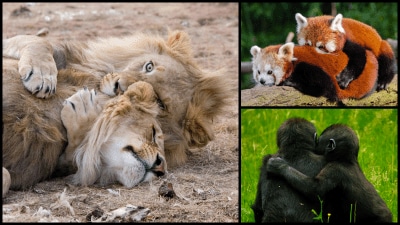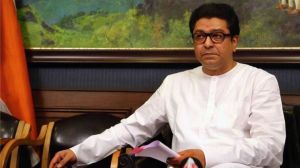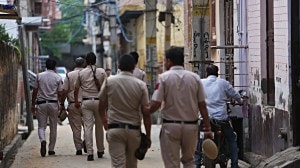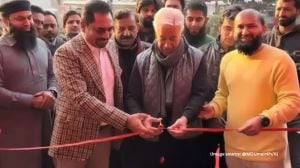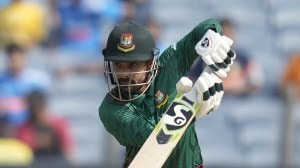Same place, same story, more slaughter
Outside the majestic buildings of the United Nations European headquarters in Geneva, groups of old and young men and some women have been h...

Outside the majestic buildings of the United Nations European headquarters in Geneva, groups of old and young men and some women have been huddling in protest over the past weeks. This week the crowds swelled and police put the numbers at 6,000. The world drives past the protesters glancing at their posters as they wait for the traffic lights to turn green. Now where have we seen this before?
Kosovo, independence, Milosevic, murderers, international community, human rights violations, are some of the words on the posters. They are all too familiar, just like the images of death and destruction on television. There8217;s a sense of deja vu. Five years ago, same place, same story, same international waltz. Same protests outside the UN. Bloodshed, angry mourners, revolving doors in glitzy Paris and Geneva showing peace-makers emerging and disappearing, angry words from the European Union, sabre-rattling from the United States, desperation in the Balkans.
More slaughter. More bodies lined up for televisioncameras. More grandmothers and mothers with Muslim names wearing tattered scarves and clutching the bodies of their dead men. More warnings from the west to Serbian strongman Slobodan Milosevic that his oppression of the Albanians in Kosovo will not be tolerated. Now where have we heard this before?
Inside the UN building, the last touches are being added to a very important human rights meet beginning next Monday. This year, the high-profile UN Human Rights Commission will celebrate its fiftieth anniversary and over 40 foreign ministers are scheduled to speak about human rights, individual freedoms, human aspirations and economic progress. Outside, among the protestors is a little girl holding a tiny poster on which is scribbled, 8220;Please help us.8221; Very human, very right. The UN is expected to respond with a statement calling on the Serbs to be human. Privately, diplomats say they are very anxious as each passing day brings an open conflict into sharper focus.
Kosovo8217;s Albanian leader Ibrahim Rugova whocreated a parallel ethnic Albanian state after Milosevic abolished the autonomous status of Kosovo has lost ground to supporters of the Kosovo Liberation Army because of his failure to return to autonomous status, grinding poverty and oppression by the Serbs. This week Rugova demanded independence for the province openly disregarding western pressures for a compromise called for by US Balkan envoy Robert Gelbhard. The pressure to compromise took the language of a 8220;warning8221; to all parties and Gelbhard urged Rugova to open private lines to Milosevic.
Kosovo which has a 90 per cent Albanian population was stripped of its autonomy by Belgrade in 1989 which has imposed direct rule ever since. Western countries have told Albanians they will not back demands for Kosovo8217;s independence but are urging Milosevic to grant it autonomy. They have threatened him with crippling sanctions if he doesn8217;t make progress towards a compromise with Rugova within the next ten days.
Milosevic has a habit of shaking the hands ofWestern leaders in public while condoning deaths of thousands of innocents in private. And in the past, the Serbian leader has survived UN embargoes and sanctions without any apparent damage to his power base within or prestige outside.
You would have thought there was no more place left in the poor and divided Balkans for any more aspirations of independence. But the idea that Kosovo was the next flashpoint in former Yugoslavia has been around since the Dayton peace agreement was imposed on the region. Diplomats say they are more surprised at how long this crisis took to erupt than the fact that it erupted at all. The Kosovo question is one of the issues that was directly connected to the disintegration of Yugoslavia and the wars that followed.
The national aspirations of the three Albanian communities in Albania proper, in Kosovo and in western Macedonia have been simmering just below the surface since the demise of the Albanian Communist and following the breaking up of Yugoslavia along ethnic lines,have come out into the open.
This week Albanian prime minister Fatos Nano called on the international community to not rule out military actions if sanctions didn8217;t deter In addition, it is Albania8217;s stated policy to achieve peaceful unification with Kosovo and western Macedonia, an aspiration vigorously opposed by Greece, Macedonia and Serbia. The United States whose influence among the Albanian community is seen as decisive by diplomats indicated to all the three communities in the early Nineties that it did not support Albanian unification, that the Kosovars and western Macedonians must be granted full autonomy stipulated in one of the peace plans Carrington peace conference.
The inviolability of borders remains in force for Bosnia, Croatia, Serbia and Macedonia.
Diplomats say regardless of how one views the equation, the secession of Kosovo demanded by the separatists means war between Serbs and Albanians. Western diplomats say Milosevic may choke on Kosovo. But, judging by how the Serbian leaderhas outwitted the West in the past, no ones8217; betting on that. At least not yet.
- 01
- 02
- 03
- 04
- 05


